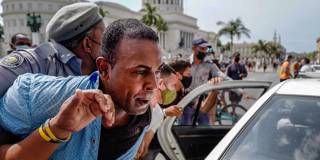The assassination of Haiti’s president and protests in Cuba this month are in line with a long tradition of summertime crises in the Caribbean. But this year’s political unrest is likely to have more far-reaching effects than previous bouts of instability.
MEXICO CITY – In the Caribbean, summer is when things happen. As the weather heats up and hurricanes pass through, passions tend to flare and crises erupt. Yet such crises rarely occur in more than one country at a time, and the dangers they pose are generally limited. Not this year.
On July 7, armed men stormed the private residence of Haitian President Jovenel Moïse in the middle of the night and shot him dead, shocking the country and setting off a political power struggle. Prime Minister Claude Joseph, who has served as acting president since Moïse’s death, has now agreed to hand over power to Ariel Henry, whom Moïse appointed as the country’s next prime minister just two days before being killed. But while this could go some way toward defusing the immediate political crisis, the assassination does not bode well for Haiti’s stability or prosperity.
This month has also brought the largest display of dissent in Cuba in decades, with thousands of Cubans taking to the streets to protest deteriorating living conditions and a lack of basic goods, including medicine, during a worsening COVID-19 outbreak. Many called for an end to the 61-year-old communist regime.

MEXICO CITY – In the Caribbean, summer is when things happen. As the weather heats up and hurricanes pass through, passions tend to flare and crises erupt. Yet such crises rarely occur in more than one country at a time, and the dangers they pose are generally limited. Not this year.
On July 7, armed men stormed the private residence of Haitian President Jovenel Moïse in the middle of the night and shot him dead, shocking the country and setting off a political power struggle. Prime Minister Claude Joseph, who has served as acting president since Moïse’s death, has now agreed to hand over power to Ariel Henry, whom Moïse appointed as the country’s next prime minister just two days before being killed. But while this could go some way toward defusing the immediate political crisis, the assassination does not bode well for Haiti’s stability or prosperity.
This month has also brought the largest display of dissent in Cuba in decades, with thousands of Cubans taking to the streets to protest deteriorating living conditions and a lack of basic goods, including medicine, during a worsening COVID-19 outbreak. Many called for an end to the 61-year-old communist regime.